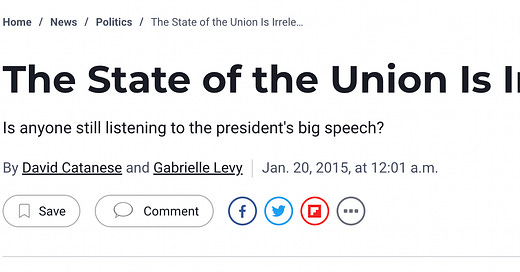The SOTU is irrelevant
Quick: Which SOTU speech redefined Donald Trump or altered Barack Obama's political trajectory?
I’ve gradually warmed to the belief that many — if not most — conventional political metrics matter less than the prevailing political class want to believe in the grand scheme of ultimate electoral outcomes. Not that they don’t matter at all — but that political professionals’ and reporters’ emphasis on them is appreciably disproportionate to their impact on attaining victory.
Fundraising, field organization, endorsements, national polling of presidential races, 99 county tours and who the next RNC chairperson sit atop my list of overblown political agents.
There’s also an annual event here in Washington that is liberally overhyped for its ability to change the direction of a presidency or reframe a national narrative. This is not an argument to wholly ignore Thursday’s State of the Union address, it’s just a simple reminder to treat it for the multiple-day storyline it will foment, rather than elevate it as a “game changing” speech that will resonate with swing voters in late August.
Unless President Biden falls off the podium or falls asleep on it, you won’t remember the details of what he said by the first pitch of baseball season. (My most indelible memory of any SOTU is when Rep. Joe Wilson screamed “You lie!” at President Obama. What year was that? And did Obama recast his presidency in whatever it was he said? I’d have to look it up, honestly.)
To wit, I’m sharing something from the archive. During my time at U.S. News & World Report, I was regularly tasked with writing about the State of the Union and credit my unflappable editor there — Tim Smart — for green-lighting this concept, which I fondly remember chewing over in his office.
It’s from 2015 — a full nine years ago.
Does it still hold up?
You tell me:
The state of the American union may be on the upswing, stuck in neutral or in dangerous decline, depending on one’s political persuasion.
But the president’s annual speech before a joint session of Congress and televised to a national audience Tuesday night is largely irrelevant.
"The value has been greatly diminished, not just of late. Its relevance has been slipping and the magic is gone, too," says former GOP Senate Majority Leader Trent Lott.
Viewership of the address has been on a steady decline for some time, and that's unlikely to change this year. As President Barack Obama enters the seventh year of his term, he's facing an emboldened Republican majority in both chambers of Congress, and the American public is exhausted by partisanship and skeptical that substantive progress will be made on Capitol Hill.
“I think there is a sense of fatigue with the Obama administration,” says David Greenberg, a presidential author and professor of history and media at Rutgers University. “There is a sense it’s over or it’s almost over. We’re just kind of waiting for the credits to come up. But sometimes that’s a false sense.”
Last year, Obama’s State of the Union address attracted 33 million viewers, the lowest total since President Bill Clinton’s final address in 2000 and 11 million fewer people than watched the Jan. 11 NFL playoff game between the Dallas Cowboys and Green Bay Packers on Fox. And that NFC matchup was shown on a single network; the president receives blanket coverage from every broadcast and cable news channel on the dial.
You can keep reading my entire piece on the SOTU HERE.









